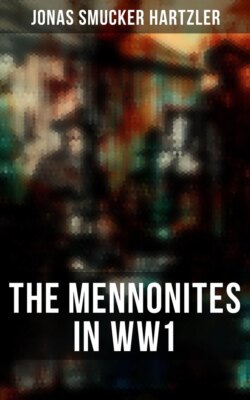Читать книгу The Mennonites in WW1 - Jonas Smucker Hartzler - Страница 52
На сайте Литреса книга снята с продажи.
Orchard and Holmes on War
ОглавлениеLast, but not least, notice some of the spiritual effects. E. W. Orchard, in his book, "The Outlook for Religion," presents the thought that less than a decade before the war a general idea prevailed "that progress was inevitable to humanity; an irresistible and quite mechanical power was working in the world which was forcing men upward, whether they would or not.... We were progressing, the dark ages were over,.... a path of steady moral advance lay before us. And now? Well, one is not sure. We are once more back to barbarity. The war has developed a ferocity and inhumanity which would have been thought impossible a few years ago. We have had to consider the spectacle of the most educated, advanced nation in the world perpetrating the most frightful horrors, crashing through an innocent country with awful brutalities, and this justified by her statesmen on the plea of military necessity."
John Haynes Holmes, in his book, "New Wars for Old," says: "See for example the experience of Dr. Frederick Lynch, as narrated in his little book, Through Europe on the Eve of the War. One day he tells us, he saw merchants, clerks, farmers, peas ants, husbands, fathers, and brothers in France and Germany, going quietly about their business. On the next day had come the declaration of war, and instantly these men were transformed into beasts." The author then goes on to say what these same people did after war had been declared, but it is too horrifying to be recorded in a work like this. He further states: "And all this before fighting had begun, or a single drop of blood had been shed.... Talk about war purifying, ennobling, strengthening men! Talk about war instilling patience, sacrifice, heroism in the human heart! War is the corrupter of virtue, the despoiler of purity, the murderer of courage, honor, and chivalry."
